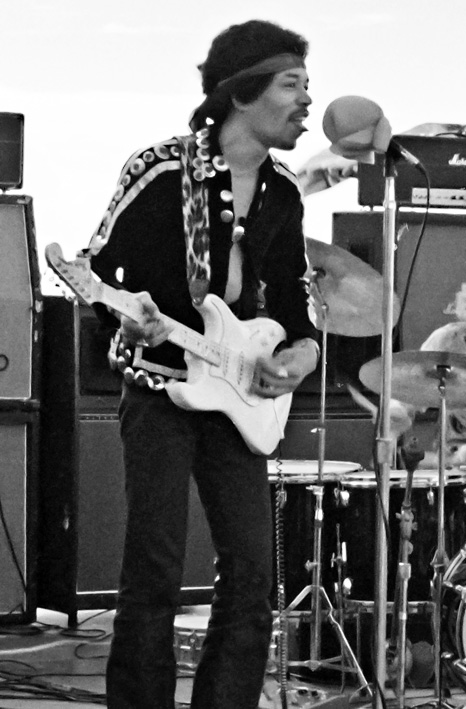Jimi Hendrix would be one angry man if he were here today. Considering the numerous lawsuits, chopped-up recordings, and misguided marketing that’s occurred since the Seattle guitar icon’s death, it’s probably best he didn’t see how things turned out. What a mess.
In my research for Hendrix on Hendrix, I discovered his prophetic quote in Melody Maker: “It’s funny the way most people love the dead. Once you are dead, you are made for life. You have to die before they think you are worth anything.”
When Hendrix died in 1970, his vast music archive was mislabeled, mishandled, and released without concern for integrity. Greedy vultures soon appeared with recordings that Hendrix had no involvement with, but were exploited to pander to eager fans. There were even records with overdubbed parts by musicians who never knew the guitarist. Concert recordings didn’t fare any better. Most were incomplete or edited to remove offensive words. Cover art was unimaginative, and photos didn’t correspond to the contents of the recording.
Surprisingly, this continued for about 30 years, until Hendrix’s father, Al, gained the rights to his son’s catalog in 1995 after a lengthy lawsuit. In years prior, Al Hendrix had received an annual check of $50,000. That’s good money for a retired landscaper, but not for the father of Jimi Hendrix. To their credit, Seattle-based Experience Hendrix, L.L.C. pulled some of the questionable releases and replaced them with better recordings. However, they didn’t quite understand that Jimi was more about the counterculture than commercialism. The family company distastefully stuck his face on golf balls, baby diapers, and even red wine, which had been partially to blame for Jimi’s death.
And then in 1999, Al and Janie Hendrix—Jimi’s stepsister—announced plans to build a lavish memorial for Jimi at Renton’s Greenwood Memorial Park and Cemetery, and asked fans to help offset costs by purchasing stones from the original gravesite, which were packaged in purple and gold and touted “to look cool with your rock-and-roll memorabilia.” The fiasco caught the attention of The Daily Show With Jon Stewart, who said, “The family [will] hopefully [dig] deep enough to catch a glimpse of the hell that will one day welcome them.”
When Al passed in 2002, Janie took control of the company. Leon Hendrix, Jimi’s younger brother, had his lawyers file three separate suits in King County Superior Court with the intent of wresting control of the estate from Janie, claiming that Al was incompetent when he wrote his will. Leon’s bequest, unfortunately, was one of Jimi’s gold records from Al’s collection, chosen by Janie.
But then there are Hendrix’s unacknowledged “love children,” Tamika Laurice James-Hendrix and James Sundquist (a Swedish national who changed his name to Jimi Hendrix Jr.), who also are not sharing in Jimi’s legacy. Tamika was born in 1966, after Jimi’s brief relationship with Diana Carpenter. Hendrix was notified about her in 1970, but never took a blood test to prove paternity. James was born in 1969 after an affair with a Swedish fan. A Swedish court recognized Sundquist as the guitarist’s son, but he has never been recognized as such in the United States.
As we approach what would’ve been Hendrix’s 70th birthday, November 27, a Jimi Hendrix clothing line designed by Lyric Culture with input from Experience Hendrix will hit the shelves at upscale Bloomingdale’s. Experience Hendrix also announced that select movie theaters around the globe would show Hendrix 70: Live at Woodstock—on the day before his birthday, oddly, and the participating theater nearest to Seattle is more than 400 miles away. It’s the latest—but unfortunately, not likely the last—sad installment in the mishandled legacy of the artist who once called Seattle home.




